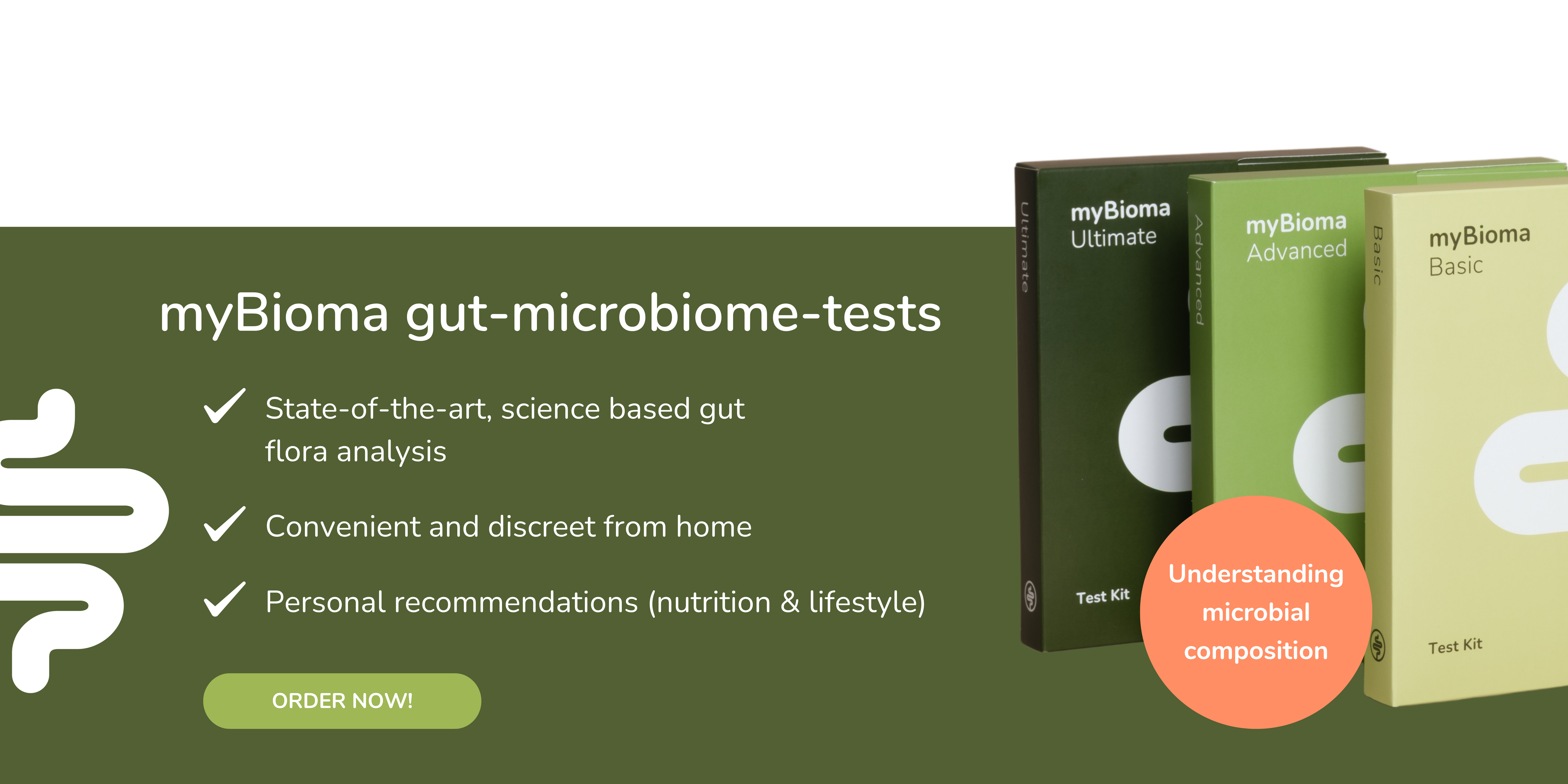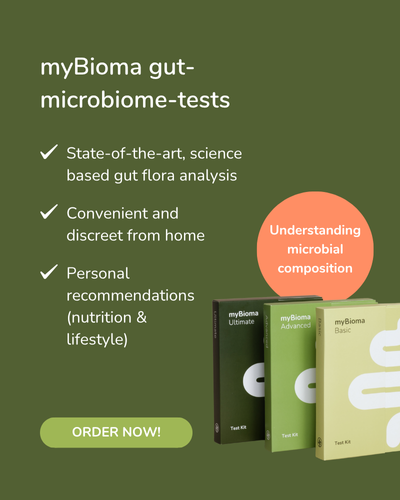Table of contents
- What is the microbiome?
- How do microbiome tests work?
- What is the process for microbiome testing?
- How much does a microbiome test cost and which providers are there?
- Is a microbiome test covered by health insurance?
- The scientific status of microbiome research
- Future perspectives of microbiome research
- When is a microbiome test useful?
- The myBioma brand: Microbiome tests to analyze your intestinal health
What is the microbiome?
The gut microbiome refers to the totality of all microorganisms in the gut. Bacteria make up the largest part of it, but viruses and fungi also inhabit our digestive system. Is that a bad thing?
Not at all! The small inhabitants of our intestines are essential for our health and perform important tasks: They help us to keep the gut healthy, to better utilize the food we eat, to produce vitamins and to reduce inflammation in the body (1).
Most microbes are found in the large intestine, as this is where the conditions are ideal for their growth (2). In addition to the gut, we also have our own unique microbiome on our skin, in our mouth, or in our respiratory tract.
How do microbiome tests work?
The analysis of the gut flora is carried out using a stool sample. Stool samples are easy to collect and contain a particularly high number of microorganisms (2). The focus of the analysis is usually on bacteria, as approximately 95% of the gut microbiome consists of bacteria on average.
To assess the overall state of the bacteria in the gut, which organisms are present, and their relative abundance, so-called sequencing methods are used. During sequencing, the DNA of the bacteria is read and then analyzed in a laboratory. This allows for the identification of which bacteria are present in what quantities, as well as their respective functions.
Next-generation sequencing is the most common sequencing method, in which a differentiation can be made between (3):
Amplicon Sequencing:
Amplicon sequencing examines a specific gene segment, the 16S rRNA gene in bacteria. This gene segment is particularly well suited to analyzing bacteria efficiently and reliably.
Advantage: By specializing in just one specific gene segment, smaller amounts of data are generated. This makes the method more time- and cost-effective, and the analyzed segments can be examined more precisely and in more depth.
Disadvantage: less information about the entire genome of the bacteria. This makes it more difficult, for example, to distinguish between very closely related species.
Whole genome shotgun metagenomic sequencing:
Shotgun sequencing is characterized by the fact that the entire bacterial genome is analyzed and not just a section of it.
Advantage: more comprehensive information about the bacteria.
Disadvantage: Due to the larger amounts of data, individual sections are analyzed less in depth. In addition, the breakdown of the entire genome is normally not necessary for a gut microbiome test.
After sequencing, both sequencing methods use bioinformatic algorithms to generate the results by analysing the data obtained, performing certain calculations and making associations with certain health conditions.

The intestinal microbiome is analyzed using a stool sample.
What is the process for microbiome testing?
Intestinal flora testing usually involves the following steps:
- Ordering or receiving the microbiome test
- Sample collection and return shipment
- Filling out the questionnaire
- Sequencing in the laboratory and report generation
- Receipt of results
Ordering the test kit
Most gut microbiome tests, such as the myBioma microbiome tests, can be conveniently ordered online and will reach you by mail within the next few days. Test kits are also available from selected pharmacies, doctors or nutritionists.
The sampling and timely return
For the microbiome test, a small stool sample is taken and dissolved in the tube included in the test kit. Everything is tightly sealed, packaged and sent to the laboratory. The sample tube contains a liquid that preserves the stool sample during return shipping and stabilizes your sample.
Filling out the questionnaire
For most tests, it is recommended to fill out an online questionnaire. This typically contains questions that are relevant for the evaluation or that may have an influence on the microbiome composition.
Analysis in the laboratory and report generation
As soon as the sample reaches the laboratory, it is prepared for analysis so that the DNA of the bacteria can be sequenced. During sequencing, the small individual parts of the DNA are broken down. This makes it possible to identify the bacterium and its functions.
After the analysis is complete, the data obtained is further processed using bioinformatics. The results are calculated and interpreted based on the latest scientific findings and a results report is created.
Receipt of results
The result of the microbiome test is usually a comprehensive analysis report. It contains the laboratory results, detailed information on the current state of the gut microbiome and explains what this means for your health. Depending on the provider, the report also contains recommendations on how the microbiome composition can be improved or optimized.

The contents of the myBioma Advanced test kit for a smooth process.
How much does a microbiome test cost and which providers are there?
The cost of a microbiome test can vary depending on the provider, scope and country. In Europe, most tests cost between €100 and €400. Analyses and tests without dietary recommendations or improvement suggestions are usually cheaper.
The following table lists important microbiome testing providers:
| Provider | Price | Info |
| myBioma (Biome Diagnostics) | 119 € - 219€ |
Headquarters: Austria Duration: Approx. 3 weeks Scope: Three tests available (Basic, Advanced, Ultimate): Medium to very large Languages: DE and EN Individual nutritional recommendations: Yes Consultation: Bookable at an additional cost Analysis method: 16S rRNA sequencing
|
| BIOMES world |
159 € |
Headquarters: Germany Duration: 2-4 weeks Scope: Medium to large Languages: DE, EN, ES, FR Individual nutritional recommendations: Yes Consultation: No Analysis method: 16S rRNA sequencing
|
| Unseen Bio | 219 - 329 € |
Headquarters: Denmark Duration: 3-4 weeks in the laboratory Scope- Three tests available (Standard, Premium, Expert): Medium to low Languages: DNK, EN, DE Individual nutritional recommendations: For Premium and Expert tests Consultation: At Expert-Test |
| Omni-Biotic |
148 € |
Headquarters: Austria Duration: no specific information Scope: Medium Languages: DE Individual nutritional recommendations: Yes Consultation: No
|
| Cerascreen | 152.90 € |
Headquarters: Germany Duration: Approx. 3 weeks in the laboratory Scope: Medium to low Languages: DE Individual nutritional recommendations: Yes Consultation: 15-minute telephone consultation for the test Analysis method: 16S rRNA sequencing
|
| Viome | 259.95 € (279 USD) + shipping costs if applicable |
Headquarters: USA Duration: 2-3 weeks in the laboratory Scope: Large Languages: EN Individual nutritional recommendations: Yes Consultation: No Analysis method: Metatranscriptomics (provides insights into which genes are active and which functions the microbes are currently performing)
|
Is a microbiome test covered by health insurance?
Statutory health insurance companies do not currently cover the costs of gut microbiome tests. However, it is advisable to contact your health insurance company directly for more information, as guidelines may change.
Private insurance may cover certain costs for health and diagnostic tests. To have the best chance of coverage, you should get a referral for microbiome testing from your doctor. This can often be crucial in proving the medical necessity of the test.
To find out whether or to what extent your test is covered by insurance, contact your insurance company directly.
The scientific status of microbiome research
Over the past decade, microbiome research has exploded: in the last ten years, more than 53,000 publications on the topic of gut microbiome were published (4).
In recent years, several major initiatives have emerged to promote global collaboration in the field of microbiome. The following research areas are currently in the foreground ( 1, 4, 5, 6, 7):
- To deepen the understanding of the relationships between nutrition, health and microbial diversity: Many mysteries in the gut are still unsolved. For example, the function of around 40% of the bacteria identified so far is still unknown.
- To develop and promote sustainable diets, innovative health solutions and personalized medical approaches.
- Defining the characteristics of a 'healthy' or 'normal' microbiome proves to be a very challenging task, as there is no single optimal microbiome composition, and a healthy microbiome can vary greatly from person to person. Differences also appear with respect to age, gender, and geography.
- Establishing solid, scientific foundations for microbiome-based health recommendations: There are many tips and recommendations for a healthy gut circulating, but some of them lack scientific evidence.
Future perspectives of microbiome research
Microbiome research opens up promising perspectives for personalized medicine, for example through individually tailored nutrition, probiotics, and other microbiome-based interventions (8).
In addition to traditional health data, microbiome biomarkers could soon also be used in the development of personalized nutritional strategies. Initial applications for blood sugar and blood lipid control based on machine learning are already showing success (4,9). In the future, patients with irritable bowel syndrome could be grouped according to specific symptoms and lifestyle factors, allowing for tailored treatments rather than a “one size fits all” approach (10). Such applications could contribute to the early detection and individual treatment of diseases such as type 2 diabetes, cardiovascular disease, depression, Parkinson's disease, colon cancer or chronic inflammatory bowel disease.
Want to be the first to hear about product news, get exclusive discounts, recipes and more? Join our HAPPY GUT CLUB on WhatsApp now: myBioma Happy Gut Club
For you. For your gut.
When is a microbiome test useful?
Microbiome tests are frequently criticized for their limited meaningfulness. We explain when a microbiome test actually makes sense and what you can realistically expect from it.
A microbiome test is useful if:
- You get it prescribed by a doctor or nutritionist.
- You want to know about the health status and composition of your microbiome.
- You want to find out how diverse and varied your microbiome is.
- You have been suffering from unclear digestive or intestinal problems for a long time.
- You are curious about how your microbiome can affect other areas of your body, such as your immune system, your skin or inflammation.
- You are looking for recommendations for a gut-friendly diet and lifestyle.
- You want to observe changes in the microbiome over time in order to measure the success of dietary or lifestyle changes.
- You want to identify risks for certain diseases early on.
Microbiome tests - what they can't do:
- Make diagnoses. The test cannot make diagnoses, but it does provide valuable information about connections between microbiome composition and certain health conditions or diseases.
- It is not a substitute for treatment. If you have any complaints, you should also consult a doctor or nutritionist.
- Address all aspects. Health issues are highly complex, as the social environment, your own lifestyle choices, genetics, diet, your own metabolism, stress management and many other factors play a decisive role. Get support from doctors or a nutritionist and prevent illness with a healthy lifestyle.
- Heal yourself. There's no such thing as a miracle pill or remedy for enhanced well-being. Microbiome tests can only indicate which aspects can be improved and offer recommendations and inspiration on how to pursue these improvements.
Microbiome tests suffer from a lack of standardization
Because microbiome research is a relatively new field of research, there is a lack of standardization in sample collection and analysis. This can make it difficult to compare results from different providers. Find out in advance what scope and content you will receive from different providers. If you need a follow-up test, it is advisable to stick with your original provider in order to see your progress and enable a direct comparison.
Also pay attention to certifications, such as ISO certifications, which stand for high quality and tested processes.
The validity of the tests is limited by short-term fluctuations in the microbiome
The main goal of microbiome testing is to provide a comprehensive insight into the condition and composition of the microbiome. Similar to a blood count, the test provides a snapshot, as the microbiome is constantly changing due to diet, lifestyle, exercise, disease and medications.
Nevertheless, a snapshot can still provide valuable information and reveal the current state of gut health. A certain basic microbiome is not subject to daily fluctuations, but only changes as a result of a long-term change in diet.
Retesting after about 3 to 6 months is recommended to identify progress and changes.
The test results often do not provide clear therapy recommendations
Before purchasing a microbiome test, find out to what extent treatment recommendations are included in the test. Some tests, such as the myBioma microbiome test, offer recommendations on diet and lifestyle, as well as the option of consulting a nutritionist.
Since health issues related to the microbiome are often very individual, it is advisable to see the test results as a starting point: They reflect the current state and suggest initial options for action. For specific and individually tailored interventions, it is advisable to seek support from nutritionists or doctors.
The test results also help doctors and therapists to precisely assess the current condition and derive appropriate therapy approaches.
Microbiome tests can only show associations, but not causes
The test results show that certain bacteria are associated with specific health conditions, but this does not mean they are the cause of the illness. In other words, the cause-and-effect relationship has not been definitively established in most aspects.
The microbiome, with all its different microorganisms and functions, as well as its interaction with the human organism and metabolism, is highly complex. This makes identifying causes extremely challenging. However, associations can serve as valuable clues. Even though not all bacteria are directly causally linked to diseases, these associations provide valuable insights for potential prevention strategies or personalized therapies that can be useful for individual health care.
The health benefits of a microbiome test are still scientifically unclear
Microbiome tests can provide valuable information that can help with early detection or prevention of diseases. This can play a particularly important role in chronic diseases.
The high costs are often disproportionate to the added value
Decide for yourself how much it is worth to you to take control of your own gut health with a detailed analysis. Get fascinating insights into how your microbiome influences your immune system, your skin health and your weight management - and discover possible risk factors for certain diseases at an early stage.

The myBioma microbiome tests: Order conveniently and easily from home!
The myBioma brand: Microbiome tests to analyze your intestinal health
Our vision at myBioma is to improve the quality of life of our customers and take gut health to a new level through innovative microbiome testing.
This is what myBioma stands for:
- Scientifically based results.
- Standardized procedural steps - from sample extraction and sequencing to bioinformatic analysis and data interpretation.
- Valuable insights into the unique composition and functioning of your intestinal bacteria.
- The first company in the world with double ISO certification in the field of microbiome, which stands for the highest quality and reliability.
- Evidence-based personalized nutrition and lifestyle recommendations tailored to your individual needs.
- The unique combination of state-of-the-art analytical methods of next-generation sequencing (16S amplicon sequencing) combined with a growing knowledge database on the interaction of the microbiome with the human organism as well as internally developed bioinformatic algorithms and AI-models, for the most accurate and profound results and associations.
- Identification of about 5,000 bacterial species.
- An interdisciplinary development team consisting of experts in the fields of nutritional science, medicine, bioinformatics and communication.
Are you curious now and want to find out more about our microbiome tests? You can find all information and details about the scope and contents of the myBioma test here: https://mybioma.com/en/collections/microbiome-tests
References
- Wilmanski, T., Rappaport, N., Diener, C., Gibbons, SM, & Price, ND (2021). From taxonomy to metabolic output: what factors define gut microbiome health? Gut Microbes, 13(1). https://doi.org/10.1080/19490976.2021.1907270
- National Academies of Sciences, Engineering, and Medicine; Division on Earth and Life Studies; Board on Life Sciences; Board on Environmental Studies and Toxicology; Committee on Advancing Understanding of the Implications of Environmental-Chemical Interactions with the Human Microbiome. Environmental Chemicals, the Human Microbiome, and Health Risk: A Research Strategy. Washington (DC): National Academies Press (US); 2017 Dec 29. 4, Current Methods for Studying the Human Microbiome. Available from: https://www.ncbi.nlm.nih.gov/books/NBK481559/
- https://www.cosmosid.com/blog/how-do-you-sequence-a-microbiome-5-steps-explained/
- https://www.gutmicrobiotaforhealth.com/world-microbiome-day-2024-the-knowns-and-unknowns-of-the-potential-of-gut-microbiome-for-personalized-nutrition-advice/
- https://worldmicrobiomepartnership.org/
- https://lefrenchgut.fr/the-french-gut-project/
- https://www.hmpdacc.org/overview/
- Human microbiome research: Growing pains and future promises Puschhof J, Elinav E (2023) Human microbiome research: Growing pains and future promises. PLOS Biology 21(3): e3002053. https://doi.org/10.1371/journal.pbio.3002053
- Gao Y, Li D, Liu YX. Microbiome research outlook: past, present, and future. Protein Cell. 2023 Oct 25;14(10):709-712. doi: 10.1093/procel/pwad031. PMID: 37219087; PMCID: PMC10599639.
- Byale, A. et al. (2024) 'High-Dimensional Clustering of 4000 Irritable Bowel Syndrome Patients Reveals Seven Distinct Disease Subsets', Clinical Gastroenterology and Hepatology, 22(1), pp. 173-184.e12. Available at: https://doi.org/10.1016/j.cgh.2022.09.019.








